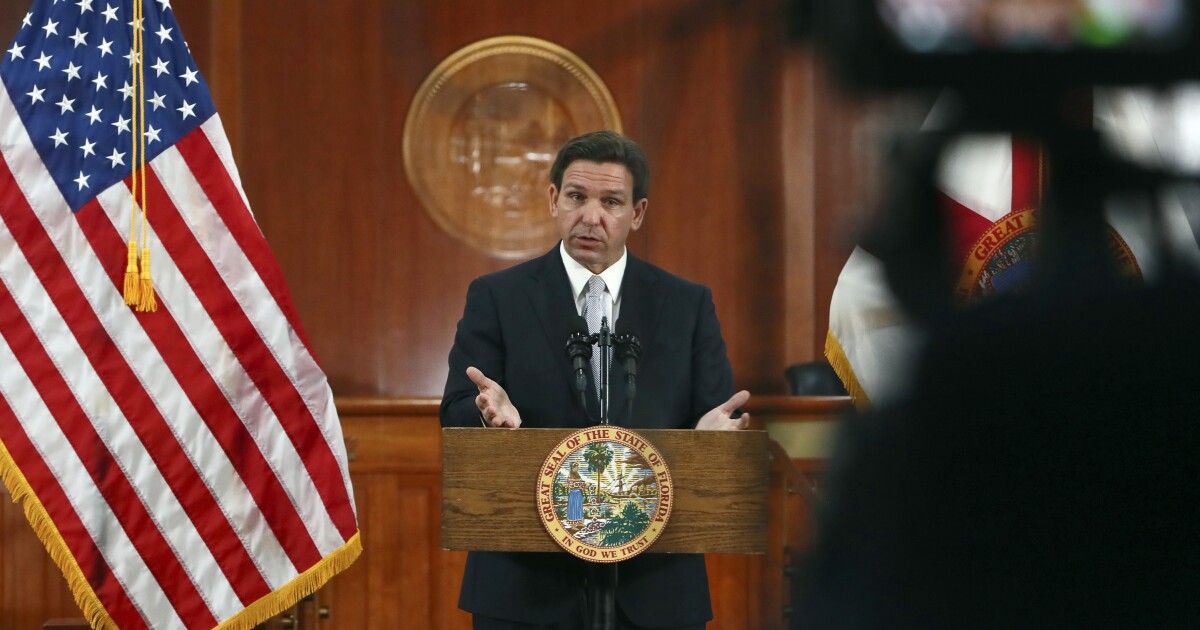

Gov. Ron DeSantis (R-FL) can expect a load of policy wins from state lawmakers in their upcoming legislative session. The most important one to his political future has nothing to do with policy.
At this point, DeSantis stands as the key 2024 Republican White House rival to former President Donald Trump, though DeSantis hasn’t yet jumped into the fray, as have former South Carolina Gov. Nikki Haley and “anti-woke” biotech entrepreneur Vivek Ramaswamy.
DeSantis’s recent actions do point to a 2024 presidential run. This includes the publication of a new book focused on his efforts over four-plus years as governor to crush “wokeism” in Florida, along with a March 4 speech at the Ronald Reagan Presidential Library in Southern California, widely seen as an audition before conservatives ahead of a 2024 bid.
Before any of that can happen, DeSantis has a technical hurdle to swat away. Florida’s “resign to run” law would force him to resign as governor if he mounted a presidential bid. The longstanding Sunshine State law is meant to force candidates for federal office to have political skin in the game, meaning they have to resign from their current office to earn a ballot spot for the next office they’re seeking.
Florida is one of a handful of states with a “resign to run” law on the books. At least, for now. Republicans dominate both chambers of the state legislature and could easily repeal the election law, and seem likely to.
A state House bill has already been filed to that effect. It’s one of several measures likely to be considered in the two-month-plus legislative session, many of which could help DeSantis burnish his conservative credentials ahead of the 2024 race.
In the next two months, the legislature will consider bills to, among other things, reshape education in Florida’s K-12 system and universities. That would follow laws enacted in the 2022 legislative session that rooted out all traces of critical race theory within the state school system and banned educators from leading classroom lessons on gender identity or sexual orientation in kindergarten through third grade.
One pending proposal would update the Parental Rights in Education law, enacted in 2022, which critics misleadingly labeled the “Don’t Say Gay” law. Other proposals would target the use of pronouns by LGBTQ students and teachers.
If Florida lawmakers do strike the resign-to-run law from the books, one prominent state resident could become a critic of the insider political maneuvering. Trump, from his Mar-a-Lago estate in Palm Beach, is already taking shots at DeSantis. A recent Trump campaign Facebook ad included a photo of both men with the caption, “Pictured: An Apprentice Learning from the Master.”
DeSantis has mostly ignored the Trump taunts. But a repeal of resign-to-run would fit into the former president’s broader “drain the swamp” message. Trump could accuse DeSantis of political self-dealing with Tallahassee insiders by changing Florida’s long-standing election rules.
Yet, while the rules are different in each state, there’s plenty of precedent for changing election laws to benefit sitting officeholders. Texas amended its resignation law so Sen. Lyndon Johnson could be reelected in 1960 while also, successfully, running as the Democratic vice presidential nominee. He won both races and resigned from the Senate. Texas Democratic Sen. Lloyd Bentsen was reelected in 1988, as understudy to Democratic presidential nominee Michael Dukakis — on a losing White House ticket, it turned out.
In 2000, the Democratic vice presidential nominee, Sen. Joe Lieberman of Connecticut, won reelection to his Senate seat even as the national ticket, headed by Vice President Al Gore, went down to defeat. And in 2008, Delaware’s 36-year Democratic senator, Joe Biden, won reelection on the same day his boss Barack Obama won the presidency. Biden resigned his Senate seat shortly before assuming the vice presidency — and then the presidency itself 12 years later, after beating Trump in 2020.






